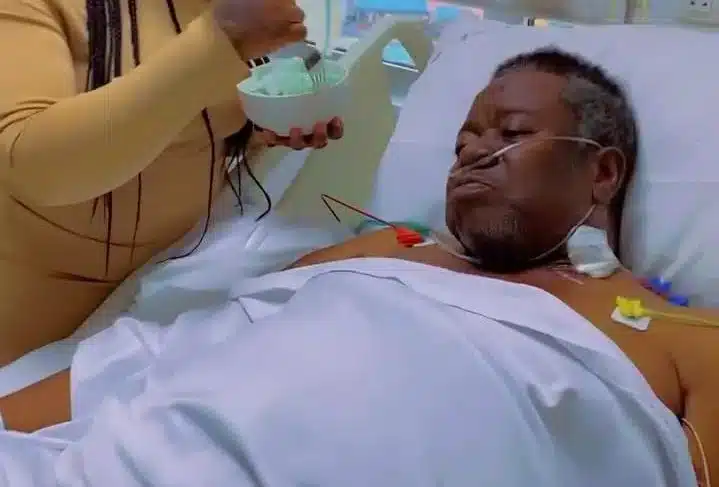
Veteran Nollywood actor John Okafor popularly know as Mr Ibu has died.
Mr Ibu, who was known for his comic roles in Nollywood, died of a cardiac arrest.
Paying tributes to the late Okafor, the president of the Actors Guild of Nigeria, Emeka Rollas, wrote on his Instagram, “Sad day for the Actors Guild of Nigeria. Kate Henshaw lost her mother earlier today, and Mr Ibu suffered cardiac arrest, according to his manager of 24 years, Don Nwuzor. I announce with a deep sense of grief that Mr Ibu did not make it. May his soul rest in peace.”
Before his death, the deceased suffered from an undisclosed illness and had both legs amputated.
In this article, Naija News will be taking a close look at the condition that led to Mr Ibu’s demise.
1. What Is Cardiac Arrest
According to Mayo Clinic, Cardiac Arrest is the sudden, unexpected loss of heart function, breathing, and consciousness.
2. Causes
Cardiac arrest can be caused by various factors, including coronary artery disease, heart attack, abnormal heart rhythms (arrhythmias), electrolyte imbalances, severe blood loss, drug overdose, trauma, and certain genetic conditions. It essentially occurs when the heart’s electrical system malfunctions, leading to an irregular heartbeat (arrhythmia) that causes the heart to stop pumping blood effectively.
3. Cardiac Arrest Is Different From Heart Attack
While often confused, cardiac arrest is different from a heart attack. A heart attack is caused by a blockage in blood flow to the heart, whereas cardiac arrest is a sudden loss of heart function
4. Symptoms
Symptoms of cardiac arrest include sudden loss of consciousness, no pulse, and cessation of breathing.
5. Those At Risk
Risk factors for cardiac arrest include age, family history of heart disease, smoking, high blood pressure, high cholesterol, obesity, and sedentary lifestyle.
6. Treatment:
Immediate CPR (cardiopulmonary resuscitation) and use of an automated external defibrillator (AED) are crucial for survival. Prompt medical intervention is essential.
7. Survival Rates
Survival rates depend on various factors including response time, quality of CPR, and access to medical care. Survival rates decrease significantly with each passing minute without intervention.
8. Prevention
Lifestyle changes such as maintaining a healthy diet, exercising regularly, quitting smoking, managing stress, and controlling underlying medical conditions can reduce the risk of cardiac arrest.
9. Awareness and Education
Public awareness campaigns and education about CPR and AED use are essential to increase survival rates.
10. Implantable Devices
In some cases, implantable cardioverter-defibrillators (ICDs) may be recommended for individuals at high risk of cardiac arrest. These devices monitor heart rhythms and deliver shocks if abnormal rhythms are detected.
Discover more from Tuzzbeat - Your Daily News, Entertainment, Sports & More
Subscribe to get the latest posts sent to your email.